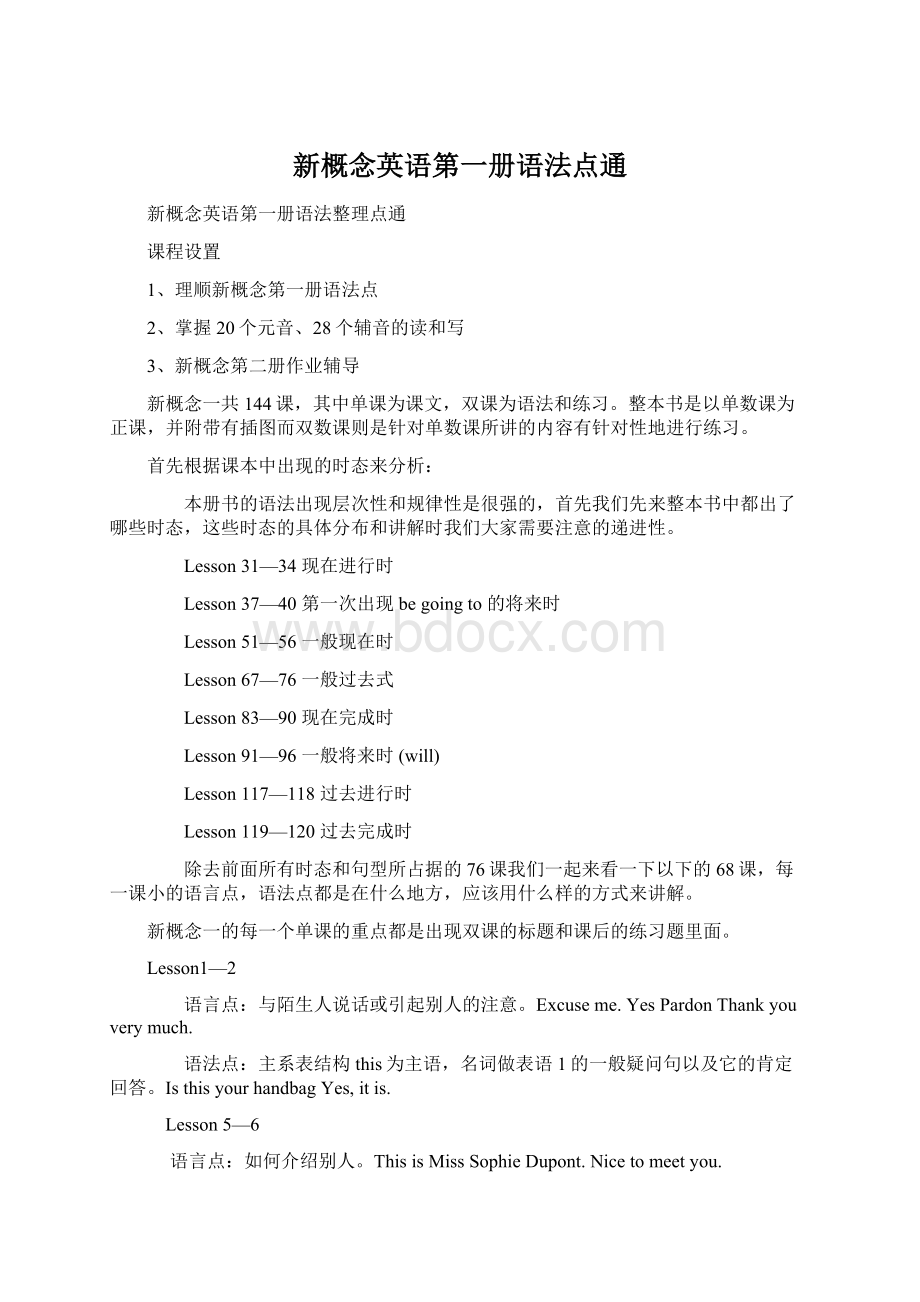 新概念英语第一册语法点通Word格式.docx
新概念英语第一册语法点通Word格式.docx
- 文档编号:18538494
- 上传时间:2022-12-19
- 格式:DOCX
- 页数:24
- 大小:29.05KB
新概念英语第一册语法点通Word格式.docx
《新概念英语第一册语法点通Word格式.docx》由会员分享,可在线阅读,更多相关《新概念英语第一册语法点通Word格式.docx(24页珍藏版)》请在冰豆网上搜索。

如何自我介绍和相互认识。
主语为第二人称的主系表结构。
AreyouFrench?
WhatnationalityareyouWhat’syourjob特殊疑问句。
Lesson9—10
朋友或熟识的人之间如何相互问候。
Howareyou?
主系表结构形容词做表语。
介词短语表示位置nearthewindow,onthetelevion,onthewall
Lesson29—30
如何发号命令。
祈使句(肯定)。
动词与宾语的固定搭配。
Lesson37—38
语言点:
如何表达将要做的事情。
现在进行时态begoingtodo结构表达将要发生的事情。
Therebe句型的一般疑问句形式。
Lesson41-42
如何表示不可数名词的量。
Lesson63-64
建议忠告。
don’tdo….Youmustn’tdo…
Lesson65-66
具体时间表示法(半点和刻钟)。
反身代词。
具体日期表达方式。
Lesson73-74
问路。
不规则动词的过去式。
形容词转变成副词。
Lesson77-78
看病。
综合时间表达方式。
Lesson105-106
办公室用语。
wantsbtodo…./tellsbtodo…以及其否定形式。
Lesson103-104
考试。
宾语从句。
(从句部分为非现在时态)
程度副词too,very,enough
Lesson125-126
/
havetodo…/don’tneedtodo…
Lesson127-128
娱乐界。
must/can’t对现在事情的肯定/否定猜测。
Lesson129-130
交通状况。
must/can’thavebeen….对过去事情的肯定/否定猜测。
Lesson131-132
度假。
may对现在/过去事情的肯定或否定猜测。
以下学的知识慢慢与新二接轨:
现在完成时:
Lesson83—90
直接引语变成间接引语:
Lesson99—102
形容词的比较级和最高级:
Lesson107—112
neither,so的用法:
Lesson113—114
不定代词的用法:
Lesson115—116
过去进行和过去完成时:
Lesson117—120
定语从句:
Lesson121—124
情态动词的综合用法:
Lesson125—132
直接引语变间接引语:
Lesson133—136(着重讲时态的倒推)
if的用法:
Lesson137—140
被动语态:
Lesson141—144
新概念英语第一册语法总结:
一般现在时
英语中的时态一共有八种,它们是:
一般现在时、现在进行时、一般过去时、现在完成时、一般将来时、过去进行时、过去完成时、过去将来时。
今天我们所要讲的就是第一种:
一般现在时——表示一般性,经常性的动作或一般性事实。
1、含有be动词的句子
Heisateacher.
Thegirlisverybeautiful.
TimandJackarestudents.
★变疑问句将be动词移到句首
Isheateacher?
Isthegirlverybeautiful?
AreTimandJackstudents
★变否定句在be动词后面加not
Heisnotateacher.
Thegirlisnotverybeautiful.
TimandJackarenotstudents.
★肯定回答及否定回答
Yes,heis./No,heisnot.
Yes,sheis./No,sheisnot.
Yes,theyare./No,theyarenot.
2、不含有be动词的句子,即含有一般动词的句子。
(1)第三人称单数及单数名词
Helikesbooks.
Shelikeshim.
Thedoglikes.
★变疑问句在句首加does,动词变为原型
Doeshelikebooks?
Doesshelikehim?
Doesthedoglikebones
★变否定句在主语及动词之间加doesn'
t,动词变为原型,原句中的动词不再有第三人称变化。
Hedoesn'
tlikebooks.
Shedoesn'
tlikehim.
Thedogdoesn'
tlikebones.
★肯定回答及否定回答:
Yes,hedoes./No,hedoesn'
t.
Yes,shedoes./No,shedoesn'
t
Yes,itdoes./No,itdoesn'
注意:
第三人称单数形式一般在动词后面加S,不要和名词复数混淆,变否定句或疑问句时名词复数没有任何变化。
(2)其他人称及复数名词
Iwanttohaveabath.
Wehavesomemeat.
Thestudentsliketeachers.
★变疑问句在句首加do
Doyouwanttohaveabath?
Dowehaveanymeat?
Dothestudentslikesmartteachers
★变否定句在主语和动词之间加don'
Youdon'
twanttohaveabath.
Wedon'
thaveanymeat.
Thestudentsdon'
tlikesmartteachers.
Yes,Ido./No,Idon'
Yes,wedo./No,wedon'
Yes,theydo./No,theydon'
现在进行时
——表示现在正在进行的动作
构成:
主语+be动词+动词的现在分词+其它成分
Wearehavinglunch.
Heisreadingabook.
Thedogisrunningafteracat.
Theboysareswimmingtheriver.
Arewehavinglunch?
Ishereadingabook?
Isthedogrunningafteracat?
Aretheboysswimmingacrosstheriver
★变否定句在be动词后面加not
Wearenothavinglunch.
Heisnotreadingabook.
Thedogisnotrunningafteracat.
Theboysarenotswimmingacrosstheriver.
★特殊疑问句:
what,which,how,where,who,etc.
疑问词+动词+主语+现在分词
Whatareyoudoing?
Whatisshedoing?
Whatisthedogdoing
没有进行时的动词(必背)
表示状态,思想,感情和感觉的动词不能表示正在进行的动作:
1.表示感觉,感官的词
see,hear,like,love,want
2.have,has当“拥有”讲时没有进行时
一般过去时
表示过去发生的动作或事件,常和表示过去的时间状语连用,如yesterday,lastnight,thedaybeforeyesterday,3daysago...
含有be动词的句子,将be动词变为过去式。
am,is的过去式为was,are的过去式为were:
Iwasatthe.
Youwereastudentayearago.
Theteacherwasverybeautifultenyearsago.
★变疑问句将be动词移动到句首
Wereyouatthebutcher'
s?
Wereyouastudentayearago?
Wastheteacherverybeautifultenyearsago
Iwasnotatthebutcher'
s.
Youwerenotastudentayearago.
Theteacherwasnotverybeautifultenyearsago.
★肯定回答否定回答
Yes,Iwas./No,Iwasnot.
Yes,youwere./No,youwerenot.
Yes,he/shewas./No,he/shewasnot.
★特殊疑问句
Whatdidyoudo(必背)
不含有be动词的句子,将动词变为过去式:
Ifinishedmyhomeworkyesterday.
Theboywenttoa.
TheSawyerslivedatKingStreetayearago.
★变疑问句在句首加did,动词变为原型
Didyoufinishyourhomeworkyesterday?
Didtheboygotoarestaurant?
DidtheSawyersliveatKingStreetayearago
★变否定句在主语和动词之间加didnot
Ididnotfinishmyhomeworkyesterday.
Theboydidnotgotoarestaurant.
TheSawyersdidnotliveatKingStreetayearago.
Yes,Idid./No,Ididn'
Yes,hedid./No,hedidn'
Yes,theydid./No,theydidnot.
现在完成时
主语+助动词have,has+过去分词
用法:
1)表示过去发生的和现在有某种联系的动作,常和just,usually,already,since等时间副词连用。
Ihavejusthadlunch.(饱了,不用再吃了。
)
Hehashadacupoftea.(不渴了,不用再喝。
Theyhavealreadyhadtheirholiday.(不能再度假了。
Theboyhasalreadyreadthebook.(已经知道书的内容了,不用再看了。
2)询问别人是否做过某事一般用现在完成时:
Haveyoufinishedyourhomework?
HaveyoubeentoBeijing?
Haveheseenthefilm
3)表示开始于过去并持续到现在的动作
IhavelivedinBeijingfortwentyyears.
Ihaveworkedforthisschoolfor1year.
4)表示一种经历,经验:
去过…地方,做过…事情,经历过…事情
Ihaveneverhada.
Ihaveneverseenafilm.
Ihaveneverbeentocinema.
IhaveeverbeentoParis.
Havebeento表示去过,havegoneto表示去了
IhavebeentoLondon.(人已经回来)
HehasgonetoLondon.(人还在那里)
5)表示一种结果,一般不和时间副词联用
Ihavelostmypen.
Ihavemyself.
Hehasbecomeateacher.
Shehasbrokenmyheart.
句型变化:
★变疑问句将助动词移到句首,变否定句在助动词后面加not.
HaveyoulostyourpenIhavenotlostmypen.
Yes,Ihave./No,Ihavenot.
Whathaveyoudone?
Whathashedone
一般过去时与现在完成时的区别:
凡是有明确的表示过去的时间状语的句子为过去时。
注意:
有些动词表示的动作有一个终点,不能再延续,因此不能和表示一段时间状语连用。
错:
I’veleftBeijingfor3days.
对:
IleftBeijing3daysago.Ihavebeenawayfrombeingfor3days.
一般将来时
——表示将来将要发生的动作,经常和tomorrow,nextyear,thedayaftertomorrow,theyearafterthenext,infivehours'
time,etc.表示将来的词联用。
结构:
主语+助动词will+动词原形
IwillgotoAmericatomorrow.
ThewillflytoJapanthemonthafterthenext.
Jackwillmoveintohisnewhousetomorrowmorning.
★变疑问句将助动词移到句首
WillyougotoAmericatomorrow?
WillthepilotflytoJapanthemonthafterthenext?
WillJackmoveintohisnewhousetomorrowmorning
★变否定句在助动词后面加not
IwillnotgotoAmericatomorrow.
ThepilotwillnotflytoJapanthemonthafterthenext.
Jackwillnotmoveintohisnewhousetomorrowmorning.
Yes,Iwill./No,Iwillnot.
Yes,he/shewill./No,he/shewillnot.
Yes,hewill./No,hewillnot.
Whatwillyoudo
过去完成时
在过去的时间里,两个动作中,发生在前的哪个动作要用过去完成时。
had+过去分词
Aftershehadfinishedherhomework,shewentshopping.
TheyhadsoldthecarbeforeIaskedthe.
ThetrainhadleftbeforeIarrivedatthe.
After/before引导的时间状语从句放在句首要在句子后面加逗号,如果放在主句后则不用加。
★变疑问句将助动词移到句首
Hadshefinishedherhomework
★变否定句在助动词后面加not
Shehadn'
tfinishedherhomework.
★肯定回答及否定回答
Yes,shehad./No,shehadn'
★特殊疑问句
Whathadshedone
过去进行时
——表示过去正在进行的动作,经常用在when,while,as引导的状语从句中。
was/were+doing
Whenmywasgoingintothediningroomthismorning,hesomecoinsonthefloor.
TheirfatherwaswatchingTVwhiletheywerehavingdinner.
WastheirfatherwatchingTVwhiletheywerehavingdinner.
TheirfatherwasnotwatchingTVwhiletheywerehavingdinner.
过去将来时
woulddo
Shesaidshewouldgoherethenextmorning.
两个特殊句型:
therebe句型,begoingto结构
1)Begoingto结构——表示打算,准备,计划做某事
★结构:
主语+be动词+goingto+动词原型
Iamgoingtomakea.
Theyaregoingtopaintit.
Thefatherisgoingtogivethebookcasetohisdaughter.
Areyougoingtomakeabookcase?
Aretheygoingtopaintit?
Isthefathergoingtogivethebookcasetohisdaughter
Iamnotgoingtomakeabookcase.
Thefatherisnotgoingtogivethebookcasetohisdaughter.
Yes,Iam./No,Iamnot.
Yes,theyare./No,theyarenot.
Yes,heis./No,heisnot.
★特殊疑问句(必背)
Whatareyougoingtodo?
Whataretheygoingtodo?
Whatisthefathergoingtodo
2)Therebe句型——表示哪里有什么东西(某处有某物)
Thereis+单数名词+表示场所的词(一般为介词词组)
Thereisabookinthisroom.
Thereisapenonthetable
Thereare+复数名词+表示场所的词(一般为介词词组)
Therearetwopensonthetable.
Therearethreeschoolsthere.
Isthereabookinthisroom?
Aretheretwopensonthetable
★变否定句在动词后面加not
Thereisnotabookinthisroom.
Therearenottwopensonthetable.
Yes,thereis./No,thereisnot.
Yes,thereare./No,therearenot.
问句
问句:
一般疑问句,特殊疑问句,选择疑问句,反意疑问句,选择疑问
- 配套讲稿:
如PPT文件的首页显示word图标,表示该PPT已包含配套word讲稿。双击word图标可打开word文档。
- 特殊限制:
部分文档作品中含有的国旗、国徽等图片,仅作为作品整体效果示例展示,禁止商用。设计者仅对作品中独创性部分享有著作权。
- 关 键 词:
- 新概念 英语 一册 语法
 冰豆网所有资源均是用户自行上传分享,仅供网友学习交流,未经上传用户书面授权,请勿作他用。
冰豆网所有资源均是用户自行上传分享,仅供网友学习交流,未经上传用户书面授权,请勿作他用。


 对中国城市家庭的教育投资行为的理论和实证研究.docx
对中国城市家庭的教育投资行为的理论和实证研究.docx
